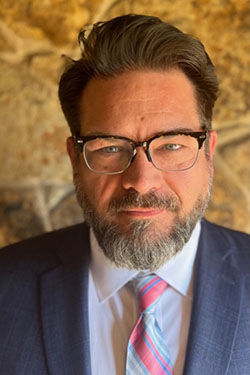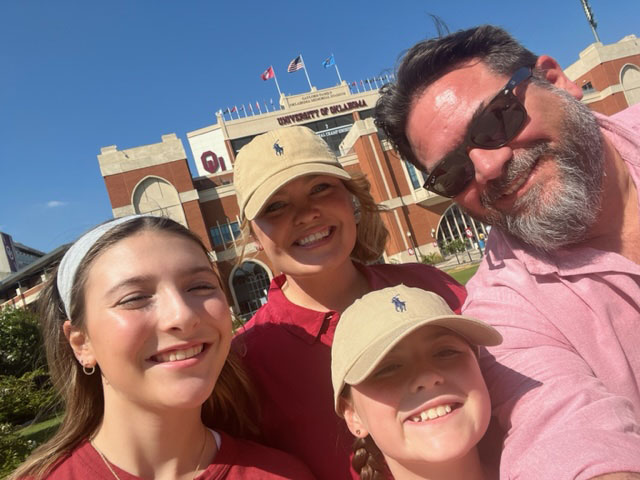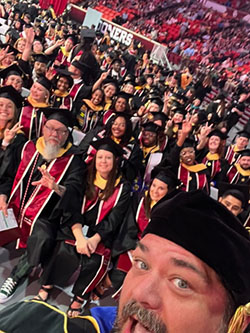In lifelong quest to reduce violence, Ph.D. alumni award winner McLeod was ‘empowered to grow’ at VCU
As David McLeod, Ph.D., thinks about his time at Virginia Commonwealth University, his reflections turn to the people and culture that accepted and poured into a doctoral student with an atypical background. A place where both his daughters were born, bookending his time in Richmond.

No wonder, then, that he uses a parental analogy when discussing how he feels about being recognized with the VCU School of Social Work’s 2024 Making a Difference Alumni Award, which goes to a distinguished graduate of the Ph.D. Program every two years.
“It’s the feeling you may have by seeing a parent smile at you with pride,” says Dr. McLeod, a 2013 graduate of the school’s doctoral program and currently the interim director at the Anne and Henry Zarrow School of Social Work at the University of Oklahoma. “An honor like this feels, to me, as if my work lives up to the value of the gifts I was given by so many during my time at VCU.”
Before earning his M.S.W. at the University of Arkansas at Little Rock, he earned a B.A. in criminal justice and had worked in law enforcement as a detective and a SWAT operator.
That’s what I love about this school. The goal was never to make me part of a homogeneous identity, but rather to embrace me, and all of us that have come through, for who we are and accelerate our effectiveness in our mission. The whole point was that we were all unique and that’s what made us powerful.
Alum David McLeod (Ph.D.’13) on the VCU School of Social Work
“There’s a great thing about VCU,” he says. “I knew who I was and what I cared about before I came. I knew my dreams and the mark I wanted to leave on the world. What I needed was to figure out how to better do that, and my foundation was locked in at VCU.
“That’s what I love about this school. The goal was never to make me part of a homogeneous identity, but rather to embrace me, and all of us that have come through, for who we are and accelerate our effectiveness in our mission. The whole point was that we were all unique and that’s what made us powerful.”
Dr. McLeod’s focus was, and continues to be, on reducing violence – “particularly that directed at anyone with a diminished capacity for self protection,” he says. “When my (law enforcement) mission outgrew the tools I had at my disposal in the first part of my career, I had to expand my capacity. I moved into forensic social work, and I’m glad I did.
“What I found as I explored the possibility of pursuing my doctoral education was that institutions, incredible institutions of learning, often struggled with understanding how I could be both fully a social worker and fully a criminologist. It was the multi-paradigmatic culture of the VCU doctoral program that accepted me as I am and empowered me to grow from a place that was truly mine.”

His daughter Piper, 14, was born during his first week in the doctoral program, while Brodi, 10, was born right after graduation and before he left Richmond for Norman, Oklahoma. In between, he found his people, primarily four faculty members and a fellow doctoral student:
- Kia Bentley, Ph.D. – “Dr. Bentley saw something in me that I did not see in myself. She had a way of communicating high expectations with an aura of pride (in me) in a way that made me feel like I could do more than I was aware of.”
- Sarah Kye Price, Ph.D. – “Dr. Price nurtured my curiosity and created a space for me to bring myself into my work in ways that were scholarly, connected and authentic.”
- Liz Cramer, Ph.D. – “Dr. Cramer embraced me and modeled how I would come to approach my community work and system integration.”
- Mary Katherine O’Connor, Ph.D. – “Dr. O’Connor pushed me to see the world in a way that literally changed every aspect of my life for the better.”
- Classmate Johnnie O’Neal, Ph.D. – “Dr. O’Neal’s friendship and commitment to staying with me throughout the ups and downs of life while in a doctoral program gave me great peace and support.”
“For me it’s all about people,” Dr. McLeod says. “My time at VCU was one of the most important periods of growth in my life.”
His professional success – and the drive to reduce violence – has evolved to include his role as editor-in-chief of the Journal of Forensic Social Work and the recently released “Handbook of Forensic Social Work” (Oxford Press).
“These research assets are examples of tools I can use to connect students and the community with knowledge on how to join me in the calling to reduce violence,” he says of the publications. “My (anti-violence) mission manifests in everything I do. From my research and community interactions, to leading a school of social work, I am constantly given the privilege to multiply my efforts by engaging others. When I teach statistics, we use forensic data, and I excite and empower students to also use data as a language to address significant social problems.”
At the end of the day, paper hangs on the wall, but the Ph.D. is you. If that is your focus, good things will come. The Ph.D. is not the product. You are the product, and the Ph.D. is a pathway to honing who you are, how you see the world, how you communicate and what skills you can bring to the table as an agent of change.
Alum David McLeod (Ph.D.’13)
Dr. McLeod says he is still an investigator at heart, one who is eager to take on the complicated challenges facing communities today.

“I love the work, the fight, and the struggle for finding what is true and real,” he says.
He has struck a balance as a “scholar-administrator” at OU with a variety of administrative positions before his current role as interim director: graduate program coordinator, research center director, associate director of research and associate director of the school.
“Throughout all this time I maintained a productive research agenda as well because that’s important to who I am and what I want to do with my career,” he says.
Earning a Ph.D. is less about the degree and more about how it creates a roadmap for what you do next, McLeod says. And social work academics must remember that they continue to be social workers as well, he says.
“At the end of the day, paper hangs on the wall, but the Ph.D. is you. If that is your focus, good things will come. The Ph.D. is not the product. You are the product, and the Ph.D. is a pathway to honing who you are, how you see the world, how you communicate and what skills you can bring to the table as an agent of change.
“Do not accept when it is proposed that academics or organizational leaders are not social workers. Just as we all can make the choice to uphold the values of the profession in everything we do, we can also choose not to do so. The Ph.D. increases your training in measurement and thought leadership. These are incredible tools to improve the world around us in tangible ways. You’re basically like an intellectual Batman. Do with that as you will.”
Dr. McLeod’s wife, Monica, is a surgical nurse in Norman. “My family is my No. 1 source of energy and pride, and not only do I do this work for them, I could not do this work without them,” he says.
Learn more about Dr. McLeod and his work at his personal website.
Previous Making a Difference Alumni Award recipients
- Nancy P. Kropf, 2006
- Audrey D. Jordan, 2008
- Sheila Crowley, 2010
- John M. Turner, 2012
- Jon E. Singletary, 2013
- Kristina M. Hash, 2016
- Trenette Clark Goings, 2020
- John C. Bricout, 2022